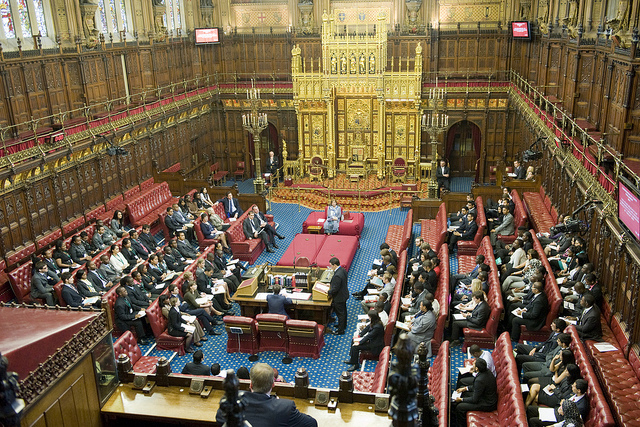Is David Cameron actually seeking to destroy the Lords?
Yesterday’s new peerage appointments attracted almost universal criticism for further adding to the inexorable growth in size of the House of Lords under David Cameron. But could the gradual erosion of the Lords’ reputation actually benefit the government by weakening parliament? Might it even be a deliberate plan? And – given that the Prime Minister holds all the cards – what can be done about it? Meg Russell comments.
This post has an eye-catching title, but it isn’t a joke – my question is deadly serious. David Cameron’s list of 45 new appointments to the Lords, announced this week, has attracted predictable wails of outrage – from the media, fromopposition parties , and indeed from myself. His Lords appointments in the last five years have been completely disproportionate. As I demonstrated in a report earlier this year, he has created new peers at a faster rate than any other Prime Minister since life peerages began in 1958. Although growth in the size of the chamber has always been a problem, since 2010 it has escalated to new proportions. As is clear from my well-rehearsed graph, updated for this week’s appointments, the upward trajectory increased sharply from 2010. In the 11 years of Labour government from 1999-2010 the chamber grew by 40-70 members (depending how you measure it); in the five short years since Cameron took office, it has grown by two to three times as much.
Cameron’s latest list of appointments was long anticipated. A few weeks ago, the Prime Minister appeared to conjure up a new convention, that the Lords should be rebalanced to reflect the politics of the Commons – I pointed out that this was a non-convention, and in an interview on the Today Programme (1hr 15min) explained why it would also be a terrible idea. For the Lords to reflect the Commons politically would make it a far less effective institution. It is precisely because no government since 1999 has had a Lords majority, and ministers have had to justify their policies there on the basis of argument, rather than simply partisan loyalty, that the Upper House has done a good job of holding government to account. The Blair and Brown governments had to navigate policy and negotiate with the Lords, in a chamber where the Conservatives remained the largest party for nine years. It is precisely its ‘no overall control’ character – with the balance of power held by Liberal Democrats and Crossbench independents – which revived the previously moribund Lords post-1999, and in doing so both strengthened parliament and led to better government.
It was widely anticipated that Cameron wanted to use these new appointments to strengthen the Conservatives’ position in the Lords, in line with his comment above. But this is not actually what he has done. His list of 45 new appointees includes 26 Conservatives, 11 Lib Dems and eight Labour nominees – giving him an increased advantage of just seven. It seems quite inexplicable that he would appoint so many Liberal Democrats, given that party’s collapse in the national vote share and in Commons seats, and that before this week it already had 101 seats in the Lords (compared to eight MPs). This makes even less sense when you consider that new Liberal Democrat peers will largely use their positions to vote against the government. This week’s appointments were packaged as ‘resignation honours’, and hence include various former MPs. But several of the Liberal Democrat nominees have never been MPs at all, so why appoint them? In a report supported by numerous senior cross-party figures four years ago I argued that dissolution honours lists were a luxury that could no longer be afforded given the Lords’ growing size. But while Cameron might have felt that he had an obligation, in line with past precedent, to senior retiring figures like William Hague, any such obligation extends to barely a handful on this list. So why not simply appoint seven Conservatives and no others? Or perhaps ten Conservatives, two Labour nominees and one Liberal Democrat? The net outcome in terms of Lords votes would have been the same, and the media outrage could have been avoided.
Given how strange this seems, is it possible that the media outrage is actually part of the strategy? Next week we will publish new research showing definitively that media coverage of the Lords has grown increasingly negative since Cameron became Prime Minister. Such coverage reflects badly on him, but the primary damage done is to the reputation of the Lords. And if the Lords’ reputation is damaged, this weakens its ability to credibly challenge the government. The chamber’s ballooning size is patently becoming absurd, as the newspapers frequently remind us. The 101 Liberal Democrats (40 of them appointed by Cameron himself, by the way) already looked disproportionate. This week’s appointments simply add to the absurdity. The Prime Minister may take a short-term media ‘hit’, but the long-term damage will be to the Lords.
This may sound like an over-elaborate conspiracy theory. That it should be a Conservative Prime Minister, of all things, who would seek to damage the Lords is counterintuitive. But the latest round of appointments (not to mention previous ones) is puzzling, until considered in this light. And these are not simply isolated musings. I have spoken to journalists who claim to have been told by senior Conservative sources that there is indeed a deliberate strategy to undermine the Lords. Such suggestions have started to creep into the newspapers (para 21). Other events in recent years have also contributed to an undermining of the chamber’s reputation. It is notable that the House of Lords Appointments Commission, responsible for proposing expert independent peers, has been invited to make only eight nominations since 2010 – compared to the 31 in the period 2005-10 (in the context of a far smaller total number of peerage appointments). The presence of independent members and experts are among the most popular features of the Lords with the public, and it has previously been widely agreed that Crossbenchers should be maintained at 20%. Instead, this group is being undermined.
Whether by accident or design, David Cameron as Prime Minister is clearly failing in his constitutional duty to appoint responsibly to the Lords, and to protect and maintain the reputation of parliament. No modern Prime Minister has made peerage appointments with this degree of recklessness. There is enormous concern inside the Lords itself about the situation, and there are rumours that this concern is shared in Whitehall as well. But until something is done to constrain his powers, the Prime Minister maintains complete control over the system – in terms of how many peers are appointed, when, and with what party balance. If such powers are abused this becomes extremely serious, given the lack of external constraint – and presents others in the system with a major constitutional challenge. Some may argue that the answer is ‘big’ reform: most obviously the introduction of election. Indeed for some the reaction to my headline could well be “destruction of the Lords: hooray!” But this all depends on what comes in its place. A move to election would require action by government, and this government clearly has absolutely no intention to bring forward a bill. So the risk is instead descent towards a moribund and discredited institution, as existed in the 1950s, with ever weaker ability to hold the government to account. Until some bigger Lords reform happens, the priority must be to maintain the integrity of parliament, and its capacity properly to do its job.
So what can be done? This is a serious crisis for the Lords, and demands serious action. The Lord Speaker has apparently convened a cross-party working group to come up with proposals by October – which could be crucial. The House of Lords Constitution Committee could also step in and express a view. There are options for motions, standing order changes and private members’ bills – to cap the size of the chamber, the numbers coming in, the proportion of party peers against independents, and even completely to overhaul the appointments process. One of the obstacles to second chamber reform – not only in the UK, but around the world – is that it is not in government’s self-interest to strengthen parliament. But when the driver of the bus seems intent on sending it careering out of control and heading for a cliff, there comes a point when the passengers must seize the wheel. In other words, parliament itself now urgently needs to act. The Lords should do so with determination and force – if it is not to simply sit by as a spectator, observing its own destruction.
—
Note: this post originally appeared on the Constitution Unit blog and is re-posted with permission. It represents the views of the author and not those of Democratic Audit. Please read our comments policy before posting.
—
 Meg Russell is Professor of British and Comparative Politics, and Deputy Director of the Constitution Unit. She is author of The Contemporary House of Lords: Westminster Bicameralism Revived (Oxford University Press, 2013) and numerous other publications about the Lords. Her most recent report Enough is Enough: Regulating Prime Ministerial Appointments to the Lords was published on 9 February 2015 by the Constitution Unit (and is downloadable by clicking the title).
Meg Russell is Professor of British and Comparative Politics, and Deputy Director of the Constitution Unit. She is author of The Contemporary House of Lords: Westminster Bicameralism Revived (Oxford University Press, 2013) and numerous other publications about the Lords. Her most recent report Enough is Enough: Regulating Prime Ministerial Appointments to the Lords was published on 9 February 2015 by the Constitution Unit (and is downloadable by clicking the title).







 Democratic Audit's core funding is provided by the Joseph Rowntree Charitable Trust. Additional funding is provided by the London School of Economics.
Democratic Audit's core funding is provided by the Joseph Rowntree Charitable Trust. Additional funding is provided by the London School of Economics.
Is David Cameron actually seeking to destroy the Lords, asks Meg Russell https://t.co/W9ZJBldaZB
[…] An average A&E department, the paper adds, has only half the number of senior doctors on duty at weekends as it does during weekdays. Is David Cameron actually seeking to destroy the Lords? […]
Seen elsewhere: Is David Cameron actually seeking to destroy the Lords? : Democratic Audit UK https://t.co/2WcIpDcLW0 #YesPlus
Is David Cameron actually seeking to destroy the Lords? asks Meg Russell https://t.co/DJEjLbVLjb https://t.co/zlURK4oHkD
Is David Cameron actually seeking to destroy the Lords? – Democratic Audit UK https://t.co/fPoivtkrxU
Is David Cameron actually seeking to destroy the Lords? https://t.co/I4oiqKbf0a #Option2Spoil
Is David Cameron actually seeking to destroy the Lords? https://t.co/OR9V1CZsnj https://t.co/MbpnD6qDWv